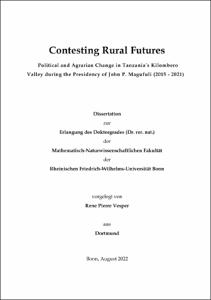Vesper, Rene Pierre: Contesting Rural Futures : Political and Agrarian Change in Tanzania's Kilombero Valley during the Presidency of John P. Magufuli (2015 - 2021). - Bonn, 2023. - Dissertation, Rheinische Friedrich-Wilhelms-Universität Bonn.
Online-Ausgabe in bonndoc: https://nbn-resolving.org/urn:nbn:de:hbz:5-70466
Online-Ausgabe in bonndoc: https://nbn-resolving.org/urn:nbn:de:hbz:5-70466
@phdthesis{handle:20.500.11811/10892,
urn: https://nbn-resolving.org/urn:nbn:de:hbz:5-70466,
author = {{Rene Pierre Vesper}},
title = {Contesting Rural Futures : Political and Agrarian Change in Tanzania's Kilombero Valley during the Presidency of John P. Magufuli (2015 - 2021)},
school = {Rheinische Friedrich-Wilhelms-Universität Bonn},
year = 2023,
month = jun,
note = {The Arusha Declaration, written by the state founder Julius Nyerere in 1967, was replaced around the year 2000 by a new national development vision, Vision 2025. State visions of the future of the nation on the one hand imagine what society Tanzania should be in the middle of the 21st century, and on the other hand mark who is responsible for this imagination and for the implementation of the future. The design of a future is thus always intertwined with actors who share it and with power that they exercise. In addition to a state vision of the future, other futures exist that are (or can be) articulated politically to varying degrees. Plural futures, according to the initial thesis of this dissertation, are in a perpetual competition with each other to make themselves discursively heard and to be materialised.
In the Kilombero Valley of the Morogoro Region, an accelerated socio-ecological transformation is currently taking place, which can be outlined as population growth, migration, deforestation, soil erosion, climate change impacts and infrastructural development. With a turbulent socio-ecological history over the last 150 years, possible futures of the Kilombero Valley appear more open, than ever. Different actors and groups of actors are imagining and realising the future that they are convinced will, or should, happen. Performative, future-oriented, everyday practices are the hinge between abstract ideology and concrete materiality.
The combination of Gramsci's political theory, Bernstein's agrarian questions and Appadurai's concept future-making, offers the possibility to relate and reflect together on political change, agrarian change and the processes of everyday future-making. As the results of empirical qualitative social research from 2018 - 2019 show, ideas about the future have become a central resource of power and legitimacy. They are the connecting element between political and agrarian change. Since not all visions of the future can be realised, there is a powerful competition along lines of class, race, gender, ethnicity and lifestyle to shape possible futures. Since under Magufuli's authoritarian presidency, civil society channels were increasingly restricted and democratic exchange about visions of the future could hardly take place, plural futures became a singular hegemonic future: hegemonic future grabbing has taken place.},
url = {https://hdl.handle.net/20.500.11811/10892}
}
urn: https://nbn-resolving.org/urn:nbn:de:hbz:5-70466,
author = {{Rene Pierre Vesper}},
title = {Contesting Rural Futures : Political and Agrarian Change in Tanzania's Kilombero Valley during the Presidency of John P. Magufuli (2015 - 2021)},
school = {Rheinische Friedrich-Wilhelms-Universität Bonn},
year = 2023,
month = jun,
note = {The Arusha Declaration, written by the state founder Julius Nyerere in 1967, was replaced around the year 2000 by a new national development vision, Vision 2025. State visions of the future of the nation on the one hand imagine what society Tanzania should be in the middle of the 21st century, and on the other hand mark who is responsible for this imagination and for the implementation of the future. The design of a future is thus always intertwined with actors who share it and with power that they exercise. In addition to a state vision of the future, other futures exist that are (or can be) articulated politically to varying degrees. Plural futures, according to the initial thesis of this dissertation, are in a perpetual competition with each other to make themselves discursively heard and to be materialised.
In the Kilombero Valley of the Morogoro Region, an accelerated socio-ecological transformation is currently taking place, which can be outlined as population growth, migration, deforestation, soil erosion, climate change impacts and infrastructural development. With a turbulent socio-ecological history over the last 150 years, possible futures of the Kilombero Valley appear more open, than ever. Different actors and groups of actors are imagining and realising the future that they are convinced will, or should, happen. Performative, future-oriented, everyday practices are the hinge between abstract ideology and concrete materiality.
The combination of Gramsci's political theory, Bernstein's agrarian questions and Appadurai's concept future-making, offers the possibility to relate and reflect together on political change, agrarian change and the processes of everyday future-making. As the results of empirical qualitative social research from 2018 - 2019 show, ideas about the future have become a central resource of power and legitimacy. They are the connecting element between political and agrarian change. Since not all visions of the future can be realised, there is a powerful competition along lines of class, race, gender, ethnicity and lifestyle to shape possible futures. Since under Magufuli's authoritarian presidency, civil society channels were increasingly restricted and democratic exchange about visions of the future could hardly take place, plural futures became a singular hegemonic future: hegemonic future grabbing has taken place.},
url = {https://hdl.handle.net/20.500.11811/10892}
}






